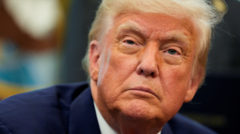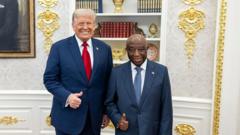As tensions rise between India and Pakistan over Kashmir, Donald Trump's proposal for US mediation has ignited controversy in India, complicating its long-standing position against third-party involvement in the dispute.
Trump’s Kashmir Mediation Proposal Challenges India's Diplomatic Stance

Trump’s Kashmir Mediation Proposal Challenges India's Diplomatic Stance
The former US President's recent offer for mediation in the Kashmir dispute has stirred mixed reactions, presenting India with a complex diplomatic dilemma.
For decades, direct foreign mediation in the Kashmir conflict has been a contentious issue for India, particularly with regards to any involvement from the United States. This past weekend, former President Donald Trump announced a ceasefire agreement, implying that the US had brokered a deal between India and Pakistan after intense clashes that raised concerns of escalating conflict. Trump’s social media posts suggested a readiness to assist both nations in seeking a long-term solution to the Kashmir issue, a topic both countries claim as integral to their sovereignty.
The Kashmir conflict traces its origins back to the partition of British India in 1947, establishing a long-standing territorial dispute between the two south Asian nations. Despite numerous bilateral negotiations over the decades, including attempts to resolve tensions peacefully, a lasting agreement has remained elusive. The recent military escalations were provoked by air strikes India launched against alleged terrorist targets in Pakistan following a deadly attack in the Indian-administered region, which India blames on Pakistan—a claim Islamabad denies.
Reacting to Trump’s assertions, Indian officials have expressed national displeasure, feeling that US intervention contradicts its historic policy of rejecting third-party negotiations. Shyam Saran, a former foreign secretary, pointed out that such initiatives directly oppose India’s longstanding stance against involving external parties. Furthermore, with Prime Minister Narendra Modi’s administration having intensified its grip on the region since revoking Jammu and Kashmir's special status in 2019, any internal or external push for renewed dialogue appears highly unlikely.
Critics, particularly from the major opposition party Congress, are calling for transparency from the government regarding potential openings for mediation discussions, questioning if Trump's remarks have unwittingly reopened diplomatic channels between India and Pakistan. In contrast, Pakistani officials express optimism, viewing the US's willingness to engage in mediation as a needed step toward peace in a decade-long impasse that has seen significant military posturing from both sides.
U.S. Secretary of State Marco Rubio also reinforced Trump's mediation offer, suggesting that discussions on a broad set of issues could commence at a neutral site. For India, however, the growing engagement with the US comes with its own complexities. As a strategic partner against a rising China, India is wary of alienating its indispensable ally while maintaining its autarky on the Kashmir dispute.
Historically, India's diplomatic engagements have avoided third-party mediation, citing the Simla Agreement of 1972, which committed both countries to resolve conflicts bilaterally. However, the growing international scrutiny of Kashmir, as reiterated by several strategic experts, emphasizes the critical need for dialogue to avert future military confrontations.
Moving forward, India stands at a crossroads, balancing its aversion to international intervention while preserving its burgeoning trade relations with the US, estimated to exceed $130 billion. Modi’s administration is tasked with not only managing domestic backlash against any perceived concessions regarding Kashmir but also navigating a delicate geopolitical landscape in South Asia that involves two historical adversaries and a global power keen on mediating peace.




















